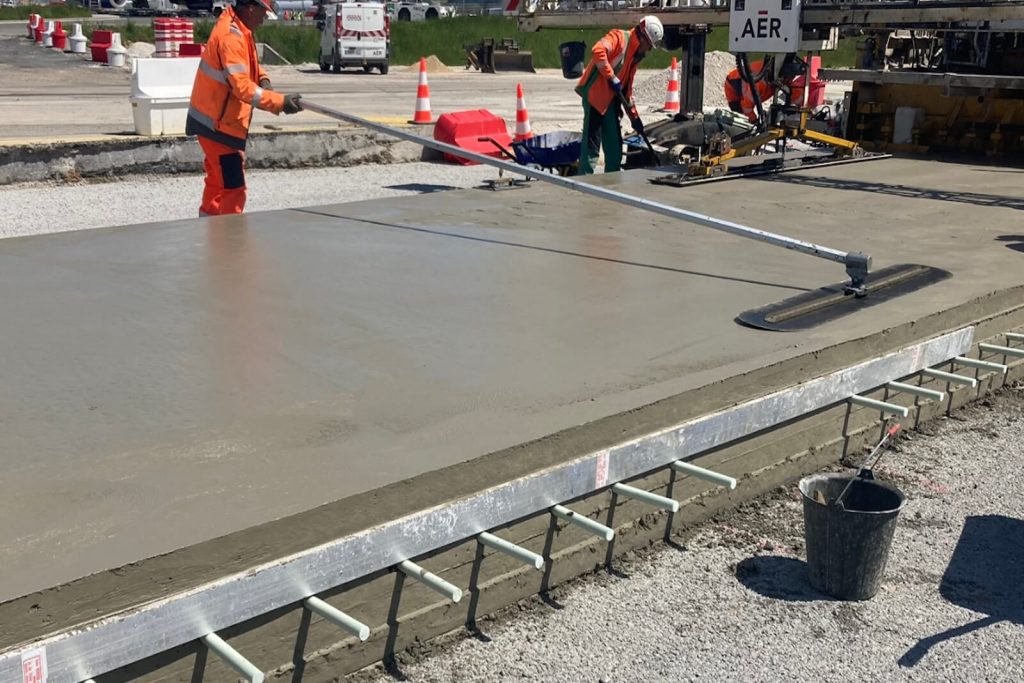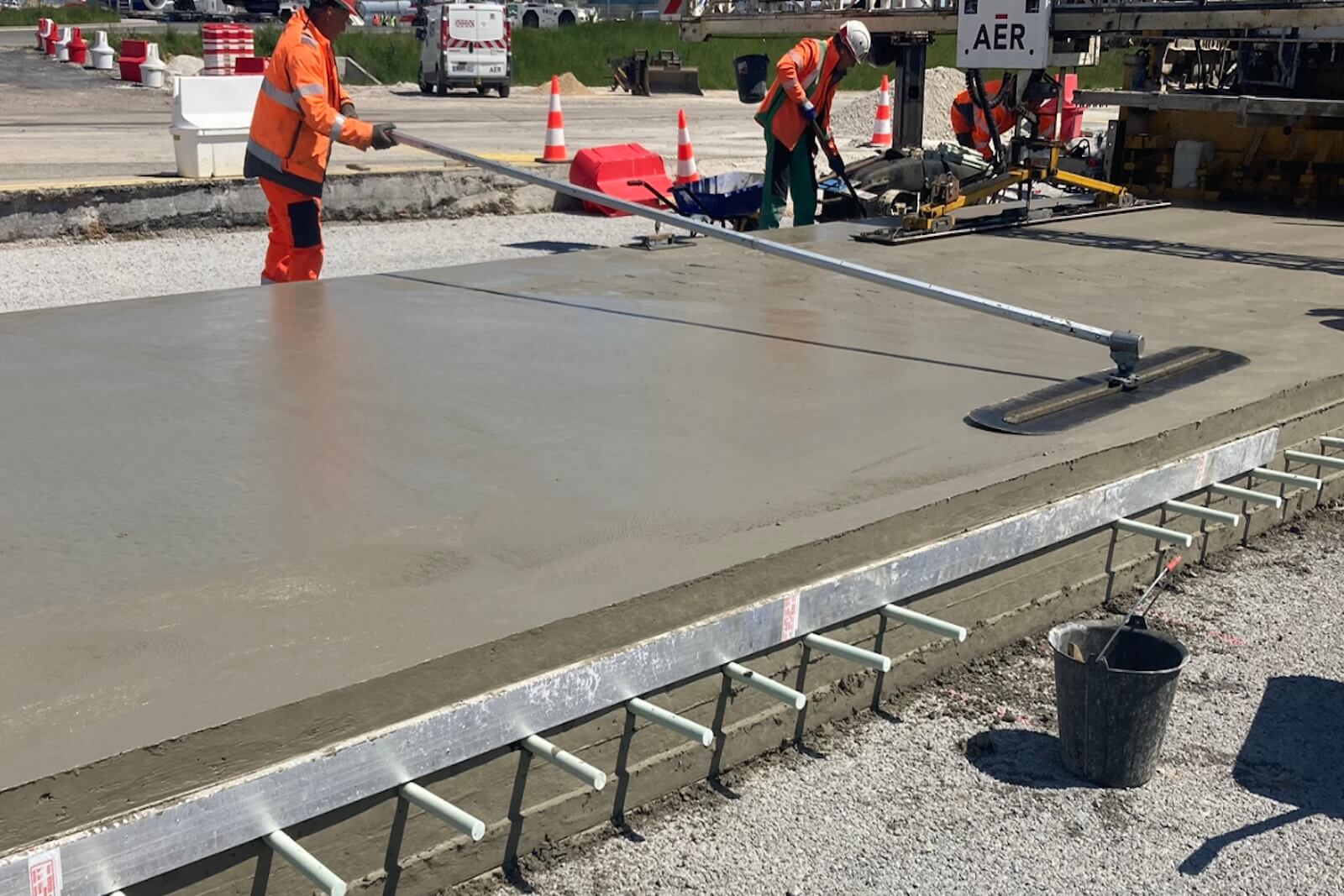Sustainable concrete reinforcement for aviation
In the construction and renovation of runways and taxiways, sustainability, safety, and the performance of the concrete surface are crucial. Fiberglass dowels and anchor rebars are the innovative solution for these heavy duty applications. They provide a corrosion free, lightweight, and cost effective alternative to traditional steel reinforcement.
Why use fiberglass in aviation infrastructure?
Runways and taxiways are exposed daily to extreme dynamic loads from aircraft, weather conditions, and chemicals such as de-icing salts or aviation fuel. Traditional steel dowels and rebars corrode over time, leading to weak spots in the concrete, costly maintenance work, and operational delays.
Glass fiber reinforced polymers (GFRP) are specifically designed to prevent these drawbacks. Thanks to their high tensile strength, low weight, and corrosion resistance, fiberglass dowels and rebars offer a future proof solution for airport concrete structures.
Airports place extremely high demands on the materials used in their infrastructure:
- Corrosion sensitivity when in contact with de-icing salts or aviation fuel
- Magnetic interference caused by steel reinforcement in areas with extensive navigation equipment
- High maintenance costs and downtime during concrete repairs
- Safety and availability of runways and taxiways that must remain operational 24/7
Fiberglass dowels and rebars (GFRP) solve these problems. They offer a combination of durability, structural performance, and unmatched lifespan without the drawbacks of steel.
What is the advantage of the long lifespan of fiberglass dowels at airports?
A longer lifespan means less maintenance, less disruption to air traffic, and a higher return on investment in airport infrastructure.
Applications in aviation
Fiberglass dowels and rebars are used in:
- Concrete joints of runways and taxiways
- Aprons for aircraft parking positions
- Taxiways and concrete lanes
- Underground infrastructure around airports (e.g., drainage or cabling near the concrete surface)
Thanks to the electrically insulating properties of fiberglass, interference with communication and navigation systems at airports is prevented. This makes GFRP particularly suitable for airports with a high level of technological infrastructure.
Project: Fiberglass dowels for Parijs Charles de Gaulle
For the expansion of the concrete network at Paris Charles de Gaulle Airport, Fiber Dowels provided a large delivery of fiberglass dowels. The choice for fiberglass reinforced dowels was made due to the high load on the concrete and the desire to prevent longterm corrosion. Thanks to the durability, lightweight properties, and corrosion resistance of our dowels, this solution contributes to a longer lifespan of the pavement and minimal disruption to air traffic. The project confirms the growing role of GFRP solutions in critical infrastructure applications within the aviation sector.

Advantages compared to steel
Fiber Dowels fiberglass dowels connect concrete slabs and ensure an even distribution of forces. Where steel dowels rust, expand, and damage the concrete, fiberglass dowels remain stable and durable.
- Corrosion free: GFRP is resistant to moisture, chemicals, and de-icing salts
- Lighter weight: Up to 4 times lighter than steel, simplifying transport and installation
- Non conductive: Prevents electromagnetic interference
- High tensile strength: Up to 2x stronger than steel at the same diameter
- Longer lifespan: Lower maintenance costs and reduced downtime
- CO₂ reduction: Environmentally friendly alternative that supports more sustainable construction
Are fiberglass dowels suitable for heavy aviation traffic?
Fiberglass dowels are designed for high dynamic loads and meet the structural requirements of modern airports, including the heavy traffic loads of commercial aircraft.
Investing in continuity and safety
The choice for fiberglass reinforcement is more than a technical advantage—it’s a strategic decision for airports focused on reliability, low operating costs, and minimal operational disruption.
Every unexpected runway closure costs money. That’s why airports around the world are increasingly choosing GFRP, which extends maintenance intervals and prevents failures due to cracking and corrosion.
Fiber Dowels’ fiberglass dowels are extensively tested according to international standards. They are produced with consistent quality, easy to handle, and available in various sizes and load classes.
Why choose Fiber Dowels?
We provide sustainable and efficient solutions for applications where reliability is essential, from port areas and airports to industrial pavements.
- Personalized advice tailored to your project and load requirements
- Fast and reliable delivery to your location
- Technical support from design through to execution
Whether you’re working on the construction of a new runway or the renovation of an existing one, we’re here to think along with you.
Want to know more about fiberglass solutions for runways and taxiways?
Contact us for advice, specifications, or a customized quote. We’re happy to help you find the smartest solution for your project.
More applications in infrastructure
Fiberglass dowels and fiberglass rebars are extremely well suited for applications such as:
- Road construction
- Parking areas
- Bridge decks
- Roundabouts
- Bus lanes & BRT lines
- Industrial estates
- Tram and railway crossings
- Container terminals
Thanks to their superior properties, these fiberglass products are increasingly chosen by municipalities, provinces, and infrastructure specialists who prioritize sustainability, cost savings, and quality.
Free Sample | Quote Request
Are you also interested in a quote or free samples of our fiberglass dowel baskets, dowels, tie bars, or T-forms? No problem — request your free samples or quote today!
Contact Us
If you have any questions about us or our products, please contact us — we’ll be happy to assist you.
